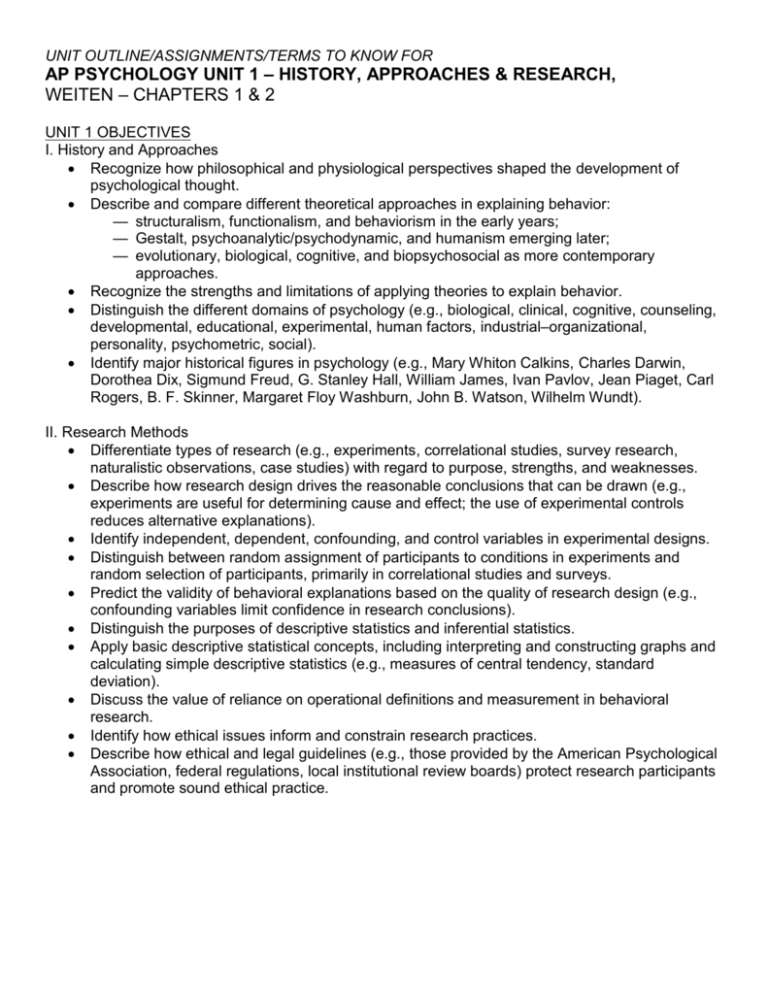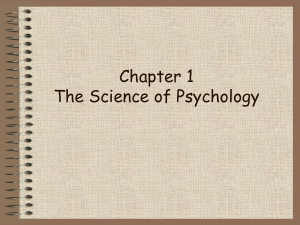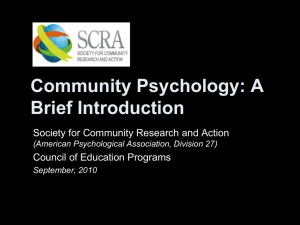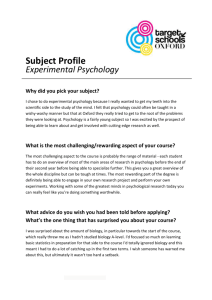AP Psychology Unit 1 – History, approaches & Research
advertisement

UNIT OUTLINE/ASSIGNMENTS/TERMS TO KNOW FOR AP PSYCHOLOGY UNIT 1 – HISTORY, APPROACHES & RESEARCH, WEITEN – CHAPTERS 1 & 2 UNIT 1 OBJECTIVES I. History and Approaches Recognize how philosophical and physiological perspectives shaped the development of psychological thought. Describe and compare different theoretical approaches in explaining behavior: — structuralism, functionalism, and behaviorism in the early years; — Gestalt, psychoanalytic/psychodynamic, and humanism emerging later; — evolutionary, biological, cognitive, and biopsychosocial as more contemporary approaches. Recognize the strengths and limitations of applying theories to explain behavior. Distinguish the different domains of psychology (e.g., biological, clinical, cognitive, counseling, developmental, educational, experimental, human factors, industrial–organizational, personality, psychometric, social). Identify major historical figures in psychology (e.g., Mary Whiton Calkins, Charles Darwin, Dorothea Dix, Sigmund Freud, G. Stanley Hall, William James, Ivan Pavlov, Jean Piaget, Carl Rogers, B. F. Skinner, Margaret Floy Washburn, John B. Watson, Wilhelm Wundt). II. Research Methods Differentiate types of research (e.g., experiments, correlational studies, survey research, naturalistic observations, case studies) with regard to purpose, strengths, and weaknesses. Describe how research design drives the reasonable conclusions that can be drawn (e.g., experiments are useful for determining cause and effect; the use of experimental controls reduces alternative explanations). Identify independent, dependent, confounding, and control variables in experimental designs. Distinguish between random assignment of participants to conditions in experiments and random selection of participants, primarily in correlational studies and surveys. Predict the validity of behavioral explanations based on the quality of research design (e.g., confounding variables limit confidence in research conclusions). Distinguish the purposes of descriptive statistics and inferential statistics. Apply basic descriptive statistical concepts, including interpreting and constructing graphs and calculating simple descriptive statistics (e.g., measures of central tendency, standard deviation). Discuss the value of reliance on operational definitions and measurement in behavioral research. Identify how ethical issues inform and constrain research practices. Describe how ethical and legal guidelines (e.g., those provided by the American Psychological Association, federal regulations, local institutional review boards) protect research participants and promote sound ethical practice. DATE WEDNESDAY, JANUARY 21 TOPICS DISCUSSED/ASSIGNMENTS WELCOME BACK! SYLLABUS CONTACT INFORMATION THURSDAY, UNIT 1 OUTLINE – READING & TERMS JANUARY 22 ASSIGNED WHAT IS PSYCHOLOGY? PSYCHOLOGY’S EARLY HISTORY STRUCTURALISM V. FUNCTIONALISM FREUD, WATSON, SKINNER FRIDAY, JANUARY 23 PSYCHOLOGY AS A PROFESSION POSITIVE PSYCHOLOGY SEVEN THEMES OF PSYCHOLOGY SUPPLEMENTAL READING: HOW TO BE A WISE CONSUMER OF PSYCHOLOGICAL RESEARCH MONDAY, JANUARY 26 QUIZ – TERMS #1-47 STEPS IN SCIENTIFIC INVESTIGATION INDEPENDENT & DEPENDENT VARIABLES EXPERIMENTAL & CONTROL GROUPS TUESDAY, JANUARY 27 DISCUSS SUPPLEMENTAL READING SMALL PROJECT – CORRELATIONAL RESEARCH ADVANTAGES & DISADVANTAGES OF RESEARCH WEDNESDAY, PRESENT SMALL PROJECTS JANUARY 28 DESCRIPTIVE/CORRELATIONAL RESEARCH CONT. STATISTICS THURSDAY, FLAWS IN RESEARCH JANUARY 29 ETHICS REVIEW FOR UNIT 1 TEST FRIDAY, JANUARY 30 UNIT 1 TEST UNIT 2 OUTLINE – READING & TERMS ASSIGNED UNIT 1 TERMS TO KNOW 1. Psychology 2. Socrates 3. Plato 4. Aristotle 5. Descartes 6. Bacon 7. Locke 8. Empiricism 9. Wundt 10. Hall 11. Structuralism 12. Titchener 13. James 14. Functionalism 15. Calkins 16. Washburn 17. Pavlov 18. Freud 19. Piaget 20. Watson 21. Skinner 22. Rogers 23. Maslow 24. Nature-Nurture Debate 25. Darwin 26. Natural Selection 27. Levels of Analysis 28. Humanistic Psychology 29. Positive psychology 30. Behavioral psychology 31. Biological psychology 32. Cognitive psychology 33. Evolutionary psychology 34. Psychodynamic psychology 35. Social-cultural psychology 36. Experimental psychology 37. Biopsychosocial Approach 38. Psychometrics 39. Developmental psychologists 40. Counseling Psychologists 41. Clinical Psychologists 42. Educational psychologists 43. Personality psychologists 44. Social psychologists 45. Industrial-organizational psychologists 46. Community psychologists 47. Psychiatrists 48. Basic Research 49. Applied Research 50. Intuition 51. Hindsight Bias 52. Overconfidence 53. Scientific Method 54. Theory 55. Hypothesis 56. Operational Definitions 57. Replication 58. Case Study 59. Survey 60. Wording Effects 61. Random Sample 62. Representative Sample 63. Biased Sample 64. Population 65. Naturalistic Observation 66. Correlation 67. Positive correlation/negative correlation 68. Correlation coefficient 69. Scatterplots 70. Causation 71. Illusory Correlation 72. Perceiving Order 73. Experiment 74. Experimental group 75. Control group 76. Blind Study 77. Double Blind Study 78. Placebo Effect 79. Experimental Condition 80. Control Condition 81. Random Assignment 82. Independent Variable/Dependent Variable 83. Confounding variable 84. Descriptive statistics 85. Central Tendency 86. Mode 87. Mean 88. Median 89. Skewed distribution (positive and negative) 90. Range 91. Standard Deviation 92. Normal curve 93. Inferential statistics 94. Statistical Significance 95. Culture 96. Informed consent 97. Debriefing 98. Ethics





